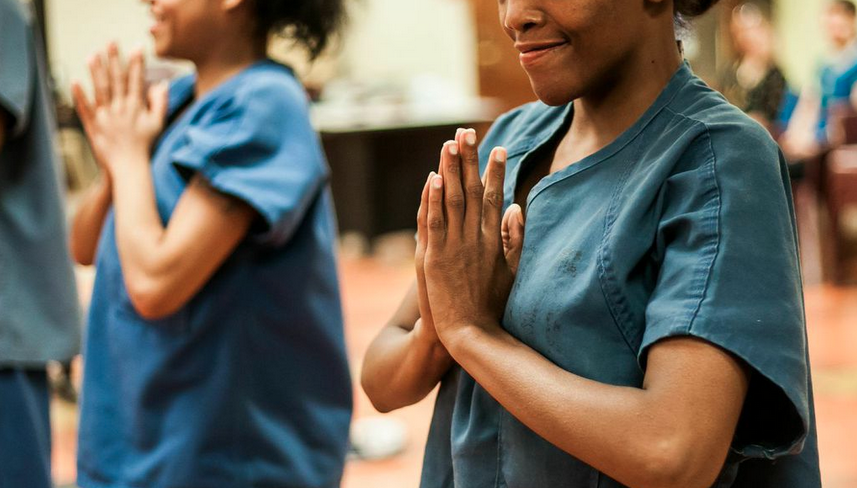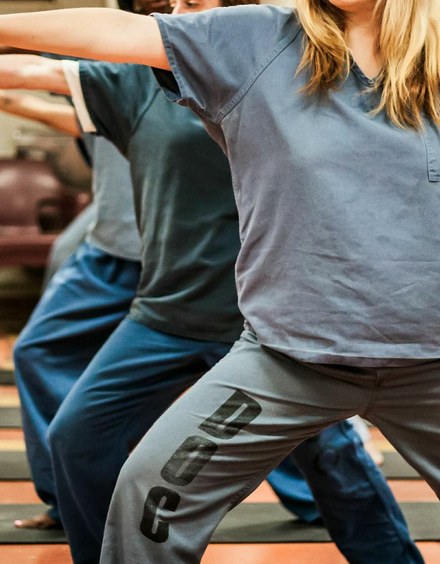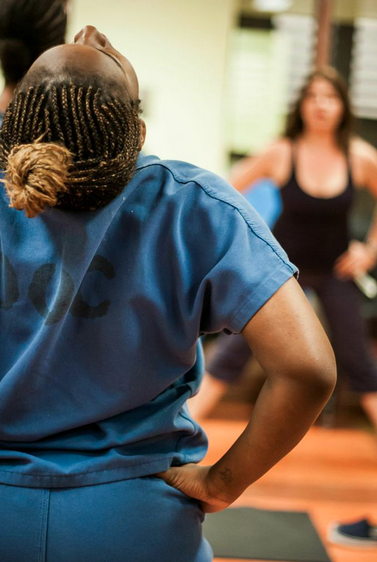Yoga for Recovery program helps inmates at Cook County Jail find some peace
By Alisa Kannett
We all have our stories of how we were introduced to yoga, but for Camille, her story is bittersweet. Camille first learned yoga while incarcerated at the Cook County Jail.
Thanks to the non-profit group Yoga for Recovery (YFR), yoga classes have been offered for female inmates in the Sheriff Women’s Justice Program at the jail for seven years.
“You are angels and are saving lives,” says Camille (not her real name).
Now released, she still practices regularly, even rolling out her mat in the kitchen of her sister’s place. When attending a recent class Bloom Yoga Studio, the teacher was wasn’t sure at first that Camille could handle the mini-mala planned to celebrate the Summer Solstice. “She rocked the 54 sun salutations, not because of advance poses but because of her energy and dedication,” said Dede Fuentes, who volunteers for YFR.
That energy and dedication has led Camille to start a not-for-profit prison outreach program for Spanish-speaking women, which already received its first grant of $600.
Offering yoga in jails and prisons has been a growing trend, even before the depiction of
downward dog on the Netflix series “Orange is the New Black.” From the Prison Yoga Project created by James Fox to the Satchidananda Prison Project, to articles written by the Huffington Post to Harvard, supporters of yoga in correctional facilities agree that yoga can comfort inmates, reduce stress and improve mood. One study found that prisoners in a 10-week yoga class also showed greater accuracy in a computer test of impulsivity and attention.
Yoga for Recovery, founded by Katy Maguire, offers five weekly classes at Cook County. The program specifically teaches trauma-sensitive yoga, which aims to reset the nervous system and help traumatized people feel more comfortable, relaxed and at peace in their own minds and bodies.
Its mission is to “recognize and nurture the innate ability of every woman to access inner strength, calm and clarity on demand” to “create the conditions for their own personal transformation.” This, in turn, creates a positive effect throughout the community, according to YFR’s mission statement.
As a volunteer teacher for YFR, I often have mixed feelings as I travel to 26th and California to teach my monthly class at the jail. As I drive to the South Side, my mind is a flurry with ideas to teach my students, but the gray, foreboding outline of the jail on the horizon gives me pause. The drabness of the facility and the security process of entering the jail always shakes me up.
Once through security, and settled in the parent/child contact room, I wait for my students to arrive. Slowly they trickle in, wearing their standard issue uniforms and finding their way to the mats. I am not a highly experienced yoga teacher but an experienced practitioner, and I do my best to take them through a well-rounded class. I can almost feel the air change in the room as I take them though simple poses and alignment.
By savasana, the feeling in the room has become one of self-introspection and calm. Relaxation—something not usually possible for incarcerated women—has been achieved.
To learn more about Yoga For Recovery, please visit yogaforrecovery.org.
Teaching Trauma-Sensitive Yoga: Science, Methods & Social Awareness training
Sunday, October 19th, 9:30 am-3:30 pm
Yogaview Lincoln Park
$60 (Note: Discounted rate available for qualified Yoga for Recovery teachers)
This six-hour workshop will lay the foundations for teaching trauma-sensitive yoga, including its scientific bases, core methods and social context. Contact Alisa Kannett (akannet@aol.com) for more information.
Alisa Kannett has practiced yoga for 14 years and has completed her 500-hour teacher certification. She is a married interior designer with two grown daughters.

























No Responses to “Yoga Behind Bars”